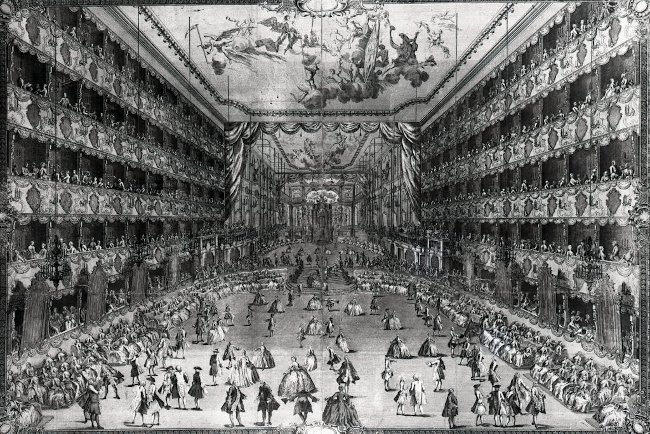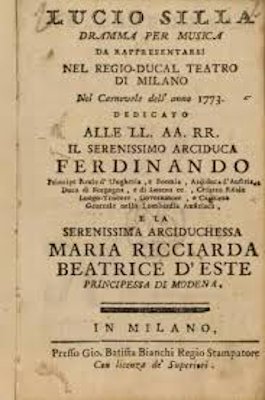Opera seria (drama per musica, text Giovanni de Gammera) in three acts, first given at the Teatro Regio Ducale, Milan, on 26 December 1772. Composition on the opera began in Salzburg in October 1772. The autograph survives in Kraków, Biblioteca Jagiellónska, Mus. ms. autogr. W. A. Mozart KV 135.

Anon, Interior of the Teatro Regio Ducale, Milan, 1742 (Milan, La Scala)
Lucio Silla is first mentioned in a letter of 19 July 1771 from Leopold Mozart to Count Gian Luca Pallavicini in Bologna – ‘I take the liberty of troubling Y[our] E[xcellency] with the present letter and of informing you that we had scarcely arrived home when I received a letter from the Impresa of the Teatro di Milano inviting my son to write the opera for the 1773 Carnival’ - and brief accounts of progress on the work, as well as its performances and success, are documented by Leopold’s letters to his wife from November and December 1772, when Mozart and his father had returned to Milan:
[14November 1772:] None of the singers has arrived yet apart from Sgra Suarti, who`s singing the 2do uomo, and the ultimo tenore[1]. The primo uomo, Sgr Rauzzini, is expected any day now, but De Amicis won`t be arriving until the end of the month or early next month. Meanwhile Wolfg. has amused himself by writing the choruses, of which there are 3[2], and by altering and partly rewriting the few recitatives that he had composed in Salzb. as the poet had sent the poem to Abbate Metastasio in Vienna for his approval, and the latter had improved and changed a great deal, while also adding a whole new scene in the 2nd act; he's now written all the recits and the overture.
[5 December 1772:] Another misfortune has befallen the poor tenor, Cordoni, who is so ill that he can't come. And so the theatre secretary has been sent to Turin by special post-chaise and a courier to Bologna to find another good tenor, who must not only be a good singer but, more especially, a good actor with a fine presence in order to play the part of Lucio Silla with distinction[3]. Given the fact that the prima donna[4] arrived only yesterday and the tenor still isn't known, you'll easily appreciate that the bulk of opera and, indeed, the main part of it hasn't been written yet.
[26 December 1772:] The opera will start in 2 or 3 hours. May God be merciful! The dress rehearsal passed off so well two days ago that we've every reason to hope for a great success. The music alone, without the ballets, lasts 4 hours.
[2 January 1773:] The opera passed off successfully, even though a number of extremely annoying incidents took place on the first night. The first problem was that the opera was due to start, as usual, one hour after the Angelus but in the event began 3 hours after it, in other words not until around 8 o`clock German time, and didn't end till 2 in the morning. The Archduke [Ferdinand] finished his midday meal only shortly before the Angelus and then had to write 5 letters of New Year greetings to T[heir] Majest[ies] the Emperor and Empress,[5] and he writes very slowly etc. etc. Just imagine: the whole theatre was so full by half past 5 that no one else could get in. At every first night the singers are always very nervous at having to appear for the first time before such a distinguished audience. For 3 hours the singers were kept anxiously waiting, while the orchestra and the entire audience - many of them standing - had to wait in a state of impatience for the opera to start, growing increasingly hot as they did so. Secondly, you need to know that the tenor,[6] whom we've had to take on for want to anything better, is a church singer from Lodi and had never performed in such a prestigious theatre and had appeared as primo tenore only twice before in Lodi, he was finally signed up only a week before the opening night. He has to gesture angrily at the prima donna in her first aria,[7] but his gesture was so exaggerated that it looked as if he was going to box her ears and knock off her nose with his fist, causing the audience to laugh. Fired by her singing, Siga de Amicis didn`t immediately understand why the audience was laughing and was badly affected by it, not knowing initially who was being laughed at, so that she didn't sing well for the whole of the first night, in addition to which she was jealous because the Archduchess clapped as soon as the primo uomo came out on stage. This was a typical castrato's trick as he'd ensured that the Archduchess had been told that he'd be too afraid to sing so that the court would encourage and applaud him. In order to console Signora de Amicis, the Archduchess summoned the singer to court at noon the very next day and for a whole hour she had an audience with Their Roy Highnesses, only then did the opera start to go well, and whereas the theatre is normally very empty for the first opera, it has been so full on the first 6 evenings |: today is the seventh :| that it's hardly been possible to slip in, and generally it's the prima donna who has maintained the upper hand and whose arias have been encored.
[9 January 1773:] The opera is going incomparably well, thank God, so that the theatre is amazingly full each day, even though people don't normally go to the first opera in large numbers unless it's particularly successful. Arias are encored every day, and the opera has gained in popularity with each performance, winning more and more acclaim from one day to the next.

Lucio Silla, title page of the libretto of the first performance, Milan, 26 December 1772
[1] Giuseppe Onofrio
[2] ‘Fuor di queste urne’ (nr. 6), ‘Se gloria il cinse’ (nr. 17) and ‘Il gran Silla che a Roma in seno’ (nr. 23)
[3] In the event, the role was taken by Bassano Morgnoni, a tenor in the Capella Regia, Turin
[4] Anna Lucia De Amicis-Buonsollazzi
[5] Joseph II and Maria Theresia
[6] Bassano Morgnoni
[7] ‘Dalla sponda tenebrosa’
- Category/Role
- Opera
- Date 1
- 1772-10
- Date 2
- 1772-12-26 (Premiere)
- Location
- Milan
- Sub-location
- Teatro Regio Ducale